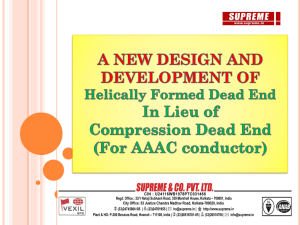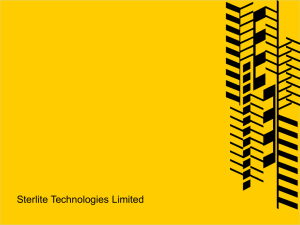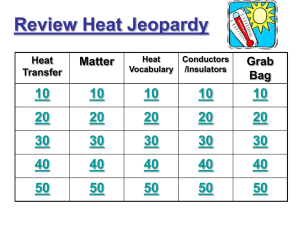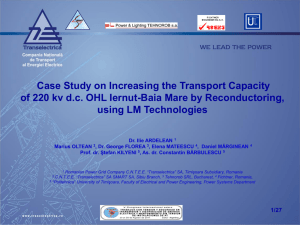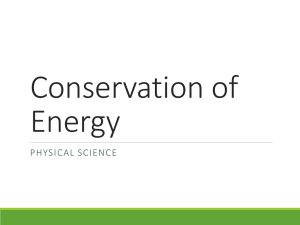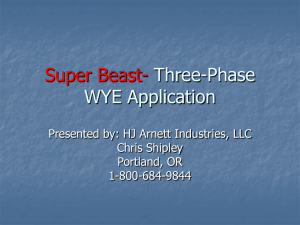HELICALLY FORMED FITTINGS
advertisement
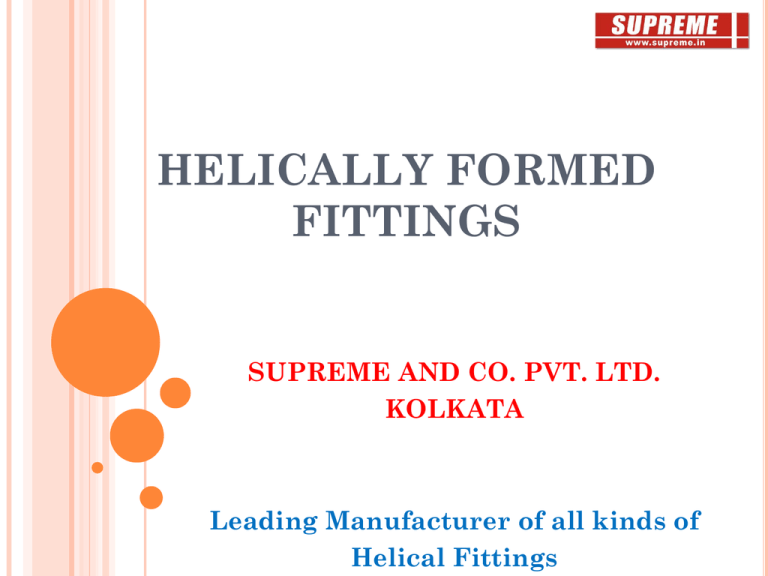
HELICALLY FORMED FITTINGS SUPREME AND CO. PVT. LTD. KOLKATA Leading Manufacturer of all kinds of Helical Fittings Helical fittings are composed of multiple helical rods which are manufactured for a particular application meant for specific conductor which are in the form of separated or preassembled, straight or looped Helical fittings are now already in use for a wide variety applications. However, the range of its application continue to expand There may be many more applications hidden in the womb of future, which we cant even foresee today This presentation in respect of the application of helical fittings mainly refers to T & D application especially to the use on overhead lines and distribution systems. Helically Formed accessories can be used as dead end termination, to support and to connect conductors, cables. In addition helically formed accessories are used to protect or to repair conductors, for attachment to pin insulators, as spacers on bundled conductors and for anchoring the street lighting brackets. They are also successfully used to prevent birds from coming in accidental contacts with the conductors. Helically Formed accessories have very successfully been used since 1950. The employment of helical fittings is not at all limited to overhead lines only. Helically Formed accessories in a large measure are also used for the construction of antennas, radar stations & for providing support to the columns in case of preengineered buildings & for anchoring submarine cables to the ships during periodic maintenance or repairs The effect of helical fittings is mostly based on the principle of development of a low unit clamping strength by uniformly distributing the clamping load over a large cross sectional area The inside diameter of the unapplied helical rods is slightly smaller than the outside diameter of conductor, cable or solid rod. It provides a very good gripping force and prevents it from slipping under tension To ensure the full performance, the helical fitting must be adapted matching to the outside diameter of conductor, cable or solid rod In addition, helical fitting and outer strand of conductor must be of same lay direction. Unless specified otherwise, helical fittings are of right-hand lay on delivery Hence, it is necessary to specify on order if helical fittings for left-hand lay conductors are required In general, helical fittings are made from a material similar to that of conductor or solid rod in order to avoid bimetallic corrosion due to contact The helical rods can be installed without use of any tool, therefore incorrect assembly is almost impossible It can be detected by mere eyesight whether it was correctly installed. Hence, helical fittings can be installed by the workers with proper guidelines. Helical fittings are provided with a label stating for which function and for what conductors, cables the respective accessory is designed for. Helical fittings can be used: - for tension / dead end termination - for suspension - for splicing - for repairing - to armor - to protect against damage - to protect against abrasion - to reduce stress - to mark - to space - to damp vibrations - to pull (installation) - to shunt weak splices - as inter-phase spacer - to increase diameter of stranded conductors, cables and solid conductors. Based on the application we can broadly separate Helically Formed fittings into FOUR Groups: Dead End Fittings Support Vibration Control Conductor Accessories DEAD END FITTINGS- USED FOR ANCHORING WIDE RANGE OF WIRES, CABLES AND CONDUCTORS Guy Wire Conductor MV ADSS OPGW Insulated Neutral Bare Conductor LV Bare Neutral Pole Top Make Off Service wire/cables Adjustable Grip Dead End Insulator Link Assembly SUPPORT Line Ties AGS Line Guards VIBRATION CONTROL & CORONA MITIGATION Spiral Vibration Damper Corona Coil CONDUCTOR ACCESSORIES Bundle Spacer T Connector Splices – Full Tension Splices – Repair Lashing Rod DEAD END FITTINGS GUY WIRE A guy is a tensioned cable designed to add stability to a free-standing structure. Normally, Utility Poles are buried in the ground and have sufficient shear strength to stand on their own; guys are only needed on some poles to support unbalanced lateral loads due to the utility wires attached to them. Conductor MV MV (Medium Voltage) – between 1000 volts (1 kV) and to about 33 kV, is used for electric distribution in urban and rural areas. Conductors are designed for designated mechanical loads and ratings and helical fittings are suitably designed to withstand the mechanical rating of the conductor. ADSS All-dielectric self-supporting (ADSS) cable is a type of optical fibre cable that contains no conductive metal elements. It is used as a communication medium. It needs no additional messenger cables for mechanical support as it is itself capable to sustain loads required by the pylons and poles. It is designed to be strong enough to allow lengths of up to 700 metres to be installed between support towers. ADSS cable is designed to be light weight and small in diameter to reduce the load on tower structures due to cable weight, wind, and ice. OPGW Optical Fibre Composite Overhead Ground Wire combines both the functions of grounding and communications. The optical fibres within the cable can be used for high-speed transmission of data. The optical fibre itself is an insulator and protects against power transmission line and lightning induction, external noise and cross-talk. INSULATED NEUTRAL & BARE NEUTRAL Bare Neutral is a circuit conductor that carries current in normal operation, which is connected to ground (or earth) and when an insulation is applied on it the same is called as Insulated Neutral. Bare Conductor LV Bare overhead conductors from other energy carriers are to utilize air as a natural insulation for conductors suspended from towers. Bare conductors are used where phase to phase separation is done through air and insulation of phase electrode from ground electrode is done using polymeric, porcelain or glass insulators. POLE TOP MAKE OFFS Pole Top Make offs are primarily intended for pole top termination of stay strands when an insulator is being used. SERVICE GRIPS Service Grips are usually used for service drops lower than 150 ft above which distribution grip dead end is recommended. These are very simple to apply and ensure a tight assembly and prevent distortion. Adjustable Grip Dead End Adjustable Grip Dead Ends are designed for use on Transmission, Antenna, Communications, and other types of guyed structures that require use of large guy strand. Adjustable Grip dead-end components such as the housing, U-Bolt, and hex nuts allow for adjustment in guy tensions. Insulator Link Assembly Insulator Link Assembly is designed to link two stay insulators in series on unearthed overhead line structures. The insulators can be placed in any required position on the stay, to which they are attached at either end by Guy Grip Dead Ends. SUPPORT Line Ties Line Ties are generally used to secure the conductors in the grooves of insulators. These are broadly classified as:1. Distribution Ties 2. Side Ties 3. Spool Ties for reel insulators 4. Plastic Ties for covered conductors The selection of the material to manufacture the ties depends on the type of conductor used e.g. aluminium alloy wires or aluminium clad steel wires for aluminium conductors, galvanized steel wires and plastic wires used for covered conductors. The ties are supplied with an elastomeric tie pad which is designed for abrasion protection with bare conductors. AGS AGS i.e. Armour Grip Suspension is a kind of helical fitting designed to reduce the static and dynamic stresses induced at a support point such that the conductor and its strands are protected against the effects of oscillations. The whole set comprises of : 1. Armour Rods which are designed to protect the conductor by reducing bending, compression, and abrasion at the support point. 2. AGS Clamps are basically manufactured from aluminium alloy treated as a housing of the helical fitting after fitment with the neoprene cushion applied with the conductor. The connecting fasteners with the hardware fittings is galvanised steel. 3. Insert made from Rubber Cushion reinforced with aluminium sheet works as a cushion on the conductor and absorbs stresses induced at the support point. Plastic Pre-form Ties These are intended for use with covered conductors to avoid abrasion of insulation in the conductors but are designed to be used for a particular area since at particular field conditions burning or tracking may occur in the tie. Line Guards Line Guards are used to protect the conductor against bending, compression, abrasion, arc over, and to provide repair, particularly where hand ties are used. MOTION CONTROL & CORONA MITIGATION Spiral Vibration Damper Damping devices are designed for the single purpose of reducing vibration. Spiral Vibration Dampers are designed to reduce Aeolian Vibration in conductors, generated by wind. These are manufactured from solid polyvinyl chloride and are helically formed. These are non corrosive and have surface hardness which does not abrade the OFC. The gripping part of the SVD should be installed about 100-120 mm away from other fittings. One SVD at each end of a span is adequate unless spans exceed 245metre where it is recommended that two are installed at each end. CORONA COIL for ADSS Corona Coil is installed over the ends of the structural reinforcing rods. The gripping section secures the unit to structural reinforcing rods and the coil section encircles the metallic rod ends, providing electrical shielding. The design is based on the effective outside diameter of the cable and while installation the alignment of the rods are kept in view to be at the center of the coil section and also making sure that no metallic rods extend beyond the open end of the coil section. This is critical to the performance of the corona coil. CONDUCTOR ACCESSORIES Bundle Spacer Bundle Spacer keep the sub-conductors within a span at designed spacing to avoid damage caused by clashing, twisting or entwining. Where motion control is a concern, rigid spacers are used in conjunction with Stockbridge dampers to give sufficient damping and spacing results. T Connector T-Connectors are used to join main and tap conductors mechanically. While used for street lighting in equal spans, extra poles can be eliminated Splices – Full Tension These are designed to restore electrical and mechanical strengths of existing joints that have been found to develop abnormally high resistances. The rods perform this function by shunting current around the installed joint and provide additional heat radiation surface. Splices – Repair Repair Splices are non-tension splices and are used where some of the outer strands of the conductors are damaged. The installation restores the strength and conductivity of the conductor and the split feature eliminates any necessity of cutting and re-splicing the line. Lashing Rod Lashing Rods are helically formed wires to secure the bearer wire to the service cables. The number of lashing rods will depend on the length of the service. ACCESSORIES FOR HELICAL FITTINGS Thimble Clevis made up of ductile iron / aluminium alloy and acts as a interface connection fitting used in attaching guy wire, dead ends, insulators and eye bolts. Thimbles are intended for providing a minimum bend radius for installation of dead ends in order to avoid fatigue failure Pulling Eye is designed to facilitate safe, fast installation of guy-grip dead ends at the anchor rod. Guy Guards are secured to guy wires after installation to protect them from acts of vandalism, accidental contact with industrial machinery, and intrusion by large wildlife or domestic animals. PERFORMANCE PARAMETERS Resiliency Flashover & withstand voltages Radio Interference Voltage Pull Off Load Tests Failure Containment Test Electrochemical Test WORLD OF SUPREME HELICALS BIBLIOGRAPHY www.google.com www.wikipedia.com EATS 43-15 EATS 43-91 EATS 43-92 BS 3288 Modern Trends & Practices in Power Sub-Transmission and Distribution Systems (Vol.1 & Vol.2) – Central Board of Irrigation & Power MS O-17 Tender Book for Yorkshire Electricity Distribution Ltd THANK YOU
